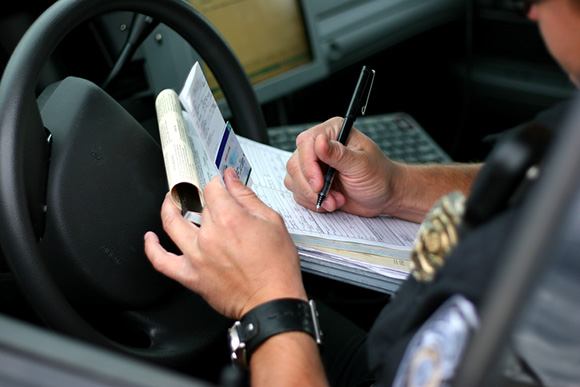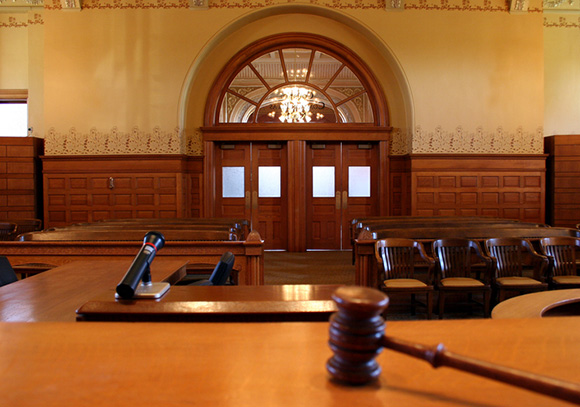Getting a traffic ticket can ruin anyone’s day. You might wonder if you can fight your ticket. You might want to fight the ticket because it’s unfair, or you might worry about your permanent record.
When you’re deciding whether to fight your ticket, you might wonder what it’s like to go to traffic court and if you will need a Las Vegas traffic ticket attorney to represent you. Here’s what happens in Las Vegas traffic court.

When the officer hands you the ticket, they’ll ask you to sign or accept a copy of the ticket. Your signature is your promise to show up in court or pay the ticket in 10 days. If you don’t agree to accept the ticket, the officer can arrest you on the spot.
You can go online and pay the ticket. If you do, the case ends. By paying the ticket, you forfeit your right to appear in court and fight the charge.
To contest the ticket, you must appear in court and plead not guilty. You may have an attorney appear on your behalf. If you plead not guilty, the court schedules the case for future proceedings.
Your case goes to a Municipal Court or a Justice Court. It goes to the court for the location where you’re accused of the offense. If you commit the offense in a municipality, your case goes to that municipality’s court. If you’re not in a municipality, your case goes to the local Justice Court
Most states treat many traffic offenses as civil violations of the law. In those states, a minor traffic offense is a violation of law that is enforced by the police, but it’s not classified as a crime. But in Nevada, all traffic offenses are classified as at least a misdemeanor.
The only offenses that don’t carry the heavy weight of a misdemeanor classification are parking offenses. But things like running a stop sign, an improper turn, and even a seatbelt violation can all land you with a criminal record and points on your license. Even though jail time is unlikely for a standard traffic violation, it’s still a possibility.
If there can be an upside to Nevada’s classification of traffic offenses as misdemeanors, it’s that a high burden of proof applies to the prosecutor to prove the case against you. The prosecutor must prove that you committed the offense beyond a reasonable doubt. That means that the judge must be quite assured of your guilt to find you guilty.
If you enter a plea of not guilty, the judge sets dates for future proceedings. Of course, court websites often spend far more time explaining how you can pay the fine than they spend describing how you can exercise your constitutional right to a trial.
Related: How to Fight a Traffic Ticket
Hohttps://www.halfpricelawyers.com/traffic-tickets/fight-traffic-ticket/wever, your constitutional rights are important. You can represent yourself or work with an experienced Las Vegas lawyer to fight your traffic ticket. You begin preparing for your case and preparing to fight your ticket before your court date even arrives.
The court may schedule a pretrial conference with the prosecuting attorney. If the court doesn’t plan a pretrial conference, it’s still a good idea to contact the state prosecutor to talk about the case. It’s essential to prepare for this conversation so that you have a concise statement for the prosecutor with reasonable requests.
If you believe that you’re not guilty of the offense, you need to explain why clearly to the prosecuting attorney. If you think that there are mitigating circumstances or you’re concerned about the penalties associated with a guilty plea, you can ask the prosecutor for a reduction in charges.
Prosecutors have discretion about whether to extend a plea bargain for a traffic offense. You might be surprised to find that they’re willing to resolve your case in exchange for the payment of a simple fine. If you’re able to resolve the matter in a way that’s agreeable to both sides, you inform the court, and you take care of any fines that are part of the agreement.
If you’re unable to resolve the case by meeting with the prosecutor, you may take your case to trial in front of a judge. A trial is a formal proceeding. The rules about admitting evidence apply to both sides.
Related: How an Attorney Can Help You Fight a Speeding Ticket
You must be prepared to make an opening statement and question witnesses. If the prosecutor calls witnesses, you may ask them questions. You must make a closing argument to the judge and ask them to find you not guilty of the offense.

The courts are usually strict about your appearance in court. But there are a few exceptions. If you’re out of state or you live more than 60 miles from court, the court may agree to waive your initial appearance. You can also ask for a waiver if you have significant health problems that make coming to court a hardship for you.
The waiver only takes care of your initial appearance. You must still appear in court for your pretrial conference and trial. In order to ask the court to waive your first appearance, you must send the court a letter, fax or email that states the case information and the reason for your waiver. You can also ask your lawyer to represent you at your arraignment hearing.
Even though there are significant penalties for a traffic ticket that you want to avoid, you still have some options if the judge is unmoved by your defense. You can take an online traffic course in exchange for a reduction in points on your license.
In addition, you may be able to have your record sealed a short time after your offense. Your attorney can help you determine if you qualify to take advantage of one or both of these options.
In Las Vegas, there’s no such thing as a minor ticket matter. All traffic tickets can have serious consequences. You want to avoid immediate sanctions including fines, license points, a criminal record, and even jail time. You also want to avoid a dark spot on your record that could cause even more significant problems if you receive additional tickets on down the line.
When you work with a skilled lawyer, you can have the confidence to know that you’re doing everything you can to fight your traffic ticket. They will help you build your case, and they also help you work to resolve your case in the best way possible.